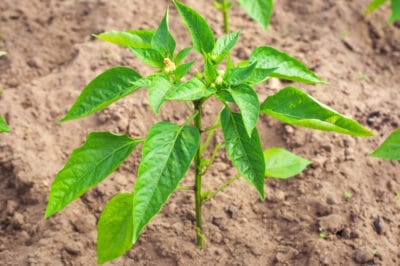Stunting
When plants stop growing it’s called stunting. They have stunted from stress whether it be:
- Watering
- Temperature
- Pest Damage
- Disease
- Nutrient Deficiency
So, the goal is to find out what caused the stunt so you can correct it. Once corrected many plants will simply begin to grow again, occasionally if the stunt was too long they may not recover.
Climate
Start with what is obvious and easy to eliminate. Has the plant been exposed to extreme temperatures? Peppers like a heat range between 70-80°F (21-26°C) and regular dips either below or above that range can cause stunt. To correct that issue, cover the plants with plastic or a hoop house to further regulate the temperature.
Has the pepper plant received regular watering? Peppers that are overwatered or allowed to dry out may enter a stunt. Give pepper plants 2 inches of water per week and adjust for precipitation in the area. If you’re not sure how much it has been getting, stick your finger into the soil. Ideally, it should be moist and damp, but not soppy wet or dry.
One other environment-related cause of stunting is transplanting. If you started peppers in a greenhouse they will need to be transplanted. Letting them grow too big for their pot will cause stunting. Rootbound plants are difficult to bring out of a stunt.
Transplanting plants without hardening them off will also stunt them. Peppers moving from greenhouse to garden need time to adjust and get used to direct light.
Pests and Disease
Pests are often still on the leaves and can be easily found and identified. Plant disease is a bit harder to spot. Yellowing leaves, brittle leaves, flower drop, or fruit rotting on the plant are all signs of possible disease.
Each specific pest or disease will have specific courses of action. To avoid these problems in the garden overall it’s important to encourage biodiversity on all levels. Diverse living soil with lots of organic matter will guard plants against disease, deficiency and pest damage.
A healthy diversity of plants in the garden will discourage pests. Deter undesirable insects through planting aromatic companions like mints and herbs. These plants will also help to bring in beneficial predatory insects that will reduce populations of problem bugs.
